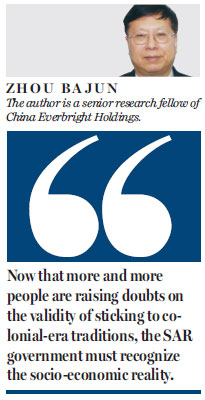It is time to abandon outdated attitudes to governance in HK
Updated: 2016-01-13 08:13
By Zhou Bajun(HK Edition)
|
|||||||||
In recent years, I have been increasingly trying to answer a question: Why has the SAR government not been able to win support from many Hong Kong residents - no matter how hard it works to improve governance? The politicization of society and worsening political tensions are no doubt an important factor. But the government has also worked hard to deal with economic and livelihood issues and had its successes, so it is baffling that it still lacks public support.
Government officials and opinionated people in the community will have little problem agreeing on what are the most pressing issues regarding the economy and people's livelihoods, but they will definitely disagree on the best solutions to these problems. When I was a member of the Strategic Development Committee under the third SAR administration I witnessed some fascinating exchanges between senior officials and leaders of political groups during regular meetings. I vividly remember one senior official, while deliberating over government policies, was frequently interrupted by a political party leader, who kept asking for a "thorough explanation".
Scenes like that are hard to forget. But why can't government officials and political party leaders agree on solutions after recognizing the problems? I believe the reason lies in the fact that officials are used to dealing with specific issues separately; while experienced political leaders have learned to see the "forest" as well as the "trees".
It should be noted that the official accountability system was adopted during the term of the second SAR administration, when all the policy bureaux heads were either from the social elites or were career bureaucrats with years of experience running government departments. It is hard to believe they were oblivious to the relationship between the individual trees and the forest.
Back in June 2005 when the first chief executive resigned for health reasons during his second term in office, necessitating a by-election, I was asked to meet a senior administrative official. The official was interested in my opinions on Hong Kong's development. I told him Hong Kong needed to set long-term development goals and have a plan to achieve them. I learned later this view failed to impress the CE-elect, who declared in a public speech soon afterward that what Hong Kong lacked was not a long-term goal but executive prowess. That person was indeed very confident about his executive capabilities and, lo and behold, a phenomenon dubbed the "administrative officers party" emerged after he took office, as some of the social elite-turned policy bureau chiefs were replaced by career bureaucrats.
By examining together the two episodes mentioned one can find it easy to see why the SAR government's hard work has not been rewarded with broad popularity: The administration has been restricted by bureaucratic traditions. This is rooted in the belief that the post-handover SAR government should have no problem maintaining Hong Kong's prosperity and stability as long as the colonial-era governance mindset stays intact.
There is no denying that Hong Kong enjoyed "30 golden years" of prosperity from 1967 to 1997, when most local households' income grew considerably. In regard to the economy, the British colonial government did not establish a high-tech industry to fill the vacuum left by the traditional manufacturing sector which had moved to the Pearl River Delta region centered on Guangdong province in the years before the handover. It also left without providing Hong Kong with a universal retirement protection scheme.
Apparently, the SAR government cannot justify following the colonial-era tradition unconditionally even if it genuinely believes in keeping the legacy alive in the post-handover era. Unfortunately this tradition has proved too strong to change. It is so strong, in fact, that Hong Kong is still debating whether "positive non-interventionism" should be abandoned in the era of globalization.
The same approach can be found over the merit of having a viable high-tech manufacturing industry in Hong Kong. It took the SAR government three years to finally obtain the Legislative Council's approval last year for establishing the Innovation and Technology Bureau to handle high-tech industry affairs. The mainstay view for economic development had been that the SAR should remain focused on developing its services industry rather than creating a high-tech manufacturing industry. It took Hong Kong society 15 years to change such a view.
Now that more and more people are raising doubts on the validity of sticking to colonial-era traditions, the SAR government must recognize the socio-economic reality. It must ditch this old governance mindset for good.

(HK Edition 01/13/2016 page10)